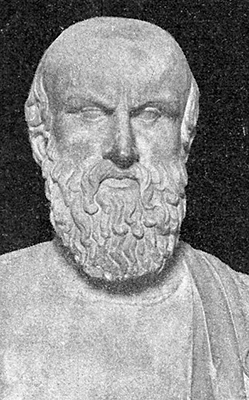More People of Greece
More Topic Categories
Related Destinations
Aeschylus (~-525 - ~-456)
 Born in Eleusis, near Athens, in 525 or 524 BC, Aeschylus is one of the three Ancient Greek tragedians and is considered by many the father of tragedy. He was the son of the nobleman and landowner Euphorion and he worked as a youth at a vineyard. According to Pausanias the geographer (2nd century AD), he was visited by god Dionysus in his sleep, instructing him to focus on writing tragedies. Not wasting time, he immediately started writing, and his first participation in a drama contest took place during the 70th Olympiad (499 BC) against poets Pratinas and Choerilus and was defeated.
Born in Eleusis, near Athens, in 525 or 524 BC, Aeschylus is one of the three Ancient Greek tragedians and is considered by many the father of tragedy. He was the son of the nobleman and landowner Euphorion and he worked as a youth at a vineyard. According to Pausanias the geographer (2nd century AD), he was visited by god Dionysus in his sleep, instructing him to focus on writing tragedies. Not wasting time, he immediately started writing, and his first participation in a drama contest took place during the 70th Olympiad (499 BC) against poets Pratinas and Choerilus and was defeated.In 490 BC, alongside his brothers Amynias and Cynegeirus, he fought at the Battle of Marathon against the Persians and their leader Darius I; Cynegeirus was killed while trying to prevent a Persian ship from leaving the shore. Ten years later, he participated in the Naval Battle of Artemision and the Naval Battle of Salamis against the mighty fleet of Xerxes I. His involvement in the Persian Wars deeply affected and influenced the great tragedian, and this is evident in his saved works which are characterised by a sense of righteousness and of fighting for one’s homeland.
He was married and his two sons were both tragic poets, as well. One of them, Euphorion, won at a contest against Sophocles and Euripides, the two other major tragedians of Ancient Greece.
Aeschylus was also initiated into the Eleusinian Mysteries, a mystical rite that took place in Eleusis in favour of goddesses Demeter and Persephone. It was considered the most sacred and respected festival of Ancient Greece. Although disclosing of the rite secrets to non-initiates was punishable by death, Aristotle informs us that some contemporaries of Aeschylus believed he had revealed some of them in his plays. In fact, it is claimed that some of the people watching one of his plays tried to stone him for this, and he took cover behind the altar of the theatre. In the trial that followed, he was acquitted, as the jury was sympathetic to his own and his brother’s valiant efforts during the Battle of Marathon.
In 470, he visited Syracuse in Sicily, invited by Hiero I, a powerful lord who invited important artists at his court, where he staged a number of plays. In the following years, he travelled again to Sicily, until 458 BC, which was his last visit. He died in the Sicilian city of Gela in 456 or 455 BC. It is said that the cause of death was a tortoise that was dropped by an eagle on his head, which the eagle mistook for a rock.
His first victory during a drama contest occurred in 484 BC, during the festival of the Great Dionysia, and it was followed by 12 more. In fact, he won the contest almost every year. He produced over 70 plays, but unfortunately, only seven are saved today. These are The Persians, Seven against Thebes, The Suppliants, the trilogy The Oresteia, and Prometheus Bound. Nowadays, there is a dispute whether Aeschylus was the creator of Prometheus Bound. A number of important historical figures were influenced by his works, including Victor Hugo, Lord Byron, Johan Wolfgang Goethe and Karl Marx. Finally, an asteroid was named after the great tragedian and is now called 2876 Aeschylus.
See Also:
 Athens Photos
Athens Photos
 Santorini Photos
Santorini Photos
 Crete Photos
Crete Photos
 Meteora Photos
Meteora Photos
 Corfu Photos
Corfu Photos


